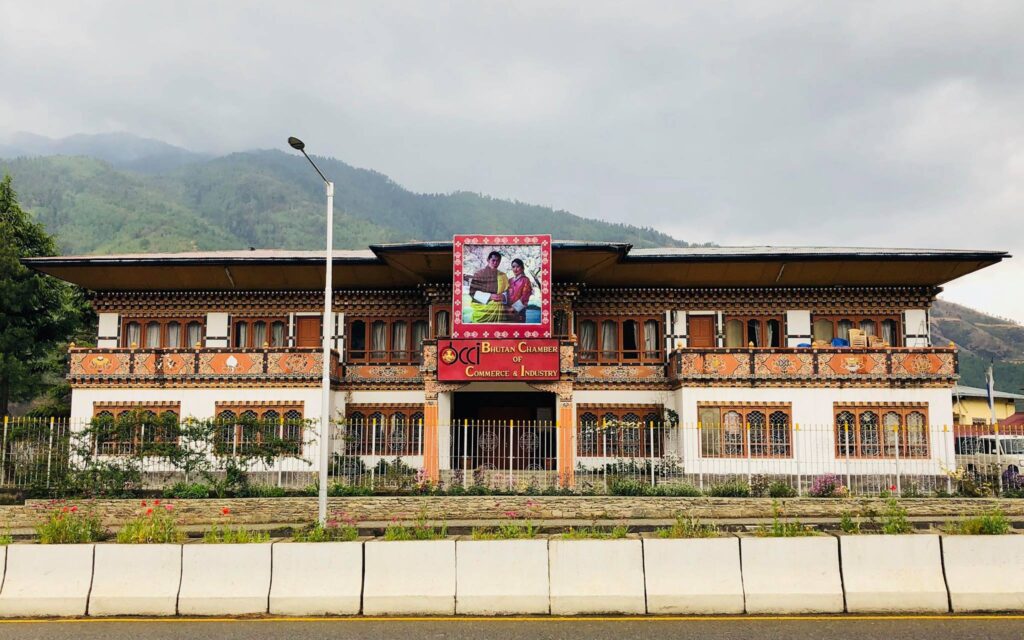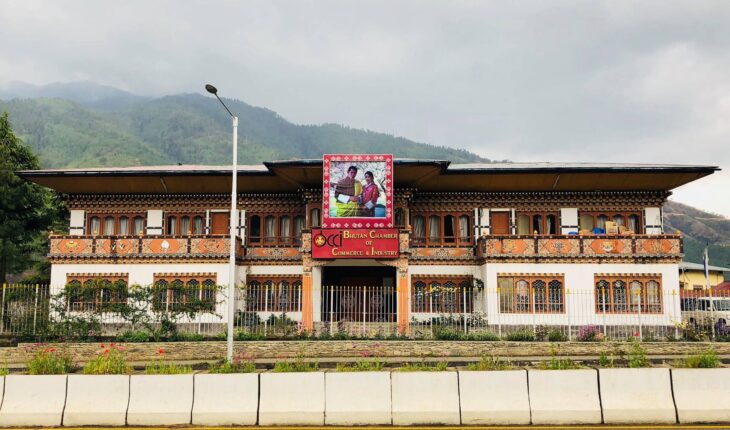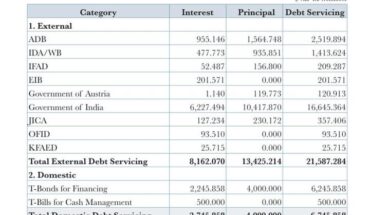
The Bhutan Chamber of Commerce and Industry (BCCI) has submitted a detailed proposal to the Office of the Prime Minister and Cabinet, advocating for a formal and institutionalized role for the private sector in implementing the country’s 13th Five-Year Plan (FYP).
The proposal, supported by the Voice for Green Change Partnership (V4GCP) a project coordinated by the Handicrafts Association of Bhutan and funded by the European Union signals a strategic shift towards a more inclusive and partnership driven approach to national development.
At a press conference held on 18th July 2025, BCCI President Tandy Wangchuk highlighted the consultative process behind the proposal.
The chamber engaged with the Office of the Committee on Appointments and Staff Confirmation (OCASC), receiving critical recommendations, which informed further consultations with sector associations.
This collaborative process culminated in the development of structured policy inputs and business plans reflecting the private sector’s collective vision for the future.
Central to the BCCI’s proposal is the transition to a “government facilitated and private sector” economic model. The chamber envisions increasing private sector investment from the current 40 percent to 50 percent by 2029, and eventually to 60 percent by 2034.
The targets are ambitious: a USD 10 billion GDP and a per capita income of over USD 12,000 by 2034.
Achieving full employment and equitable income distribution are also key goals, with the private sector positioned as a critical engine for innovation, job creation, and diversification of the economy.
BCCI President Tandy Wangchuk stated that, unlike in the past plans up to the 12th five plan year Plan, the private sector had not been part of official consultation meetings.
The new proposal seeks to change this by formally incorporating private sector input into the 13th plan.
Despite the private sector’s acknowledged importance, the BCCI identifies several persistent structural barriers that continue to hinder its growth. These include a heavy reliance on hydropower, a dominant presence of state-owned enterprises (SOEs) in key sectors, limited foreign direct investment (FDI) opportunities due to regulatory restrictions, and systemic issues affecting micro, small, and medium enterprises (MSMEs).
The agriculture sector, in particular, suffers from poor value chain integration, weak infrastructure, and limited market access. Additionally, Bhutan’s financial system is heavily dominated by public banks, curbing opportunities for diversified private sector financing.
To address these systemic constraints, the BCCI proposes four models of engagement for enhanced public-private collaboration: collaboration, privatization, outsourcing, and public-private partnerships (PPPs).
Under the collaboration model, the private sector would be actively involved in policy development and project planning.
BCCI also stresses on the importance of joint efforts in regulatory reform, co-funded infrastructure development, and strategic input into sectors such as energy, mining, agriculture, digital services, and trade.
Privatization, according to the proposal, should be pursued selectively, particularly in areas where private sector involvement could improve efficiency and outcomes.
This aligns with Bhutan’s Competition Policy of 2020 and the Constitution’s emphasis on fair market practices. With Bhutan also reconsidering its accession to the World Trade Organization (WTO), the BCCI sees an opportunity to foster competitiveness and broaden market access for Bhutanese firms.
In terms of outsourcing, the BCCI suggests this approach could help the government lower service delivery costs while enhancing quality through private sector expertise.
In addition, referencing the UK’s “Outsourcing Playbook,” the chamber calls for robust governance frameworks to ensure contract integrity and accountability.
Meanwhile, public-private partnerships (PPPs) are seen as vital instruments for mobilizing capital, sharing risks, and delivering infrastructure and services.
Though Bhutan already has a PPP Policy since 2016, BCCI recommends expanding PPP application to dry ports, renewable energy, industrial parks, and vocational training.
These areas, the chamber argues, can benefit from both domestic and international private investment and technical knowledge. The proposal itself was developed by the BCCI’s Committee of Sector Associations (BCSA), with support from a dedicated Technical Working Group.
Extensive consultations were conducted with relevant government bodies and stakeholders to align the proposal with the goals and framework of the 13th FYP.
Each recommendation is tied to specific government projects, complete with designated lead agencies, performance metrics, and financing options ranging from co-investment schemes to full private financing.
The Economic Development Cluster outlined in the proposal underscores how the private sector could improve Bhutan’s business environment, expand access to skilled labor, build critical infrastructure, and enhance the contribution of high-potential sectors to GDP.
Furthermore, joint policymaking and infrastructure development through PPPs are key areas of focus, along with strategic investment in digital transformation, green energy, and commercial agriculture.
Another important aspect of the proposal is the integration of foreign labor where needed, while ensuring Bhutanese workers are reskilled to meet evolving industry demands.
The chamber calls for a balanced workforce strategy that supports economic growth without compromising domestic employment.
Recognizing the role of startups and cottage industries in Bhutan’s economic diversification, the BCCI has recommended outsourcing the management of government-run startup centers to private industry associations.
The goal is to boost efficiency, provide better mentoring, and create stronger support ecosystems.
The proposal also includes initiatives such as the “Buy Bhutanese Product” campaign and expanded trade fairs like the “Made in Bhutan Expo” to enhance product visibility and reduce dependence on imports.
Another forward-looking recommendation is the creation of “one-stop service centers” in every dzongkhag, designed to centralize business services such as licensing, taxation, and certification.
These centers would be linked to a digital platform, ensuring streamlined and accessible services.
To realize this, the private sector plans to coordinate with the Department of Mines and Geology (DGM), the Department of Forests and Park Services (DoFPS), and the GovTech Agency to integrate and digitize government functions.
One of the most significant gaps identified in the current governance framework is the lack of a permanent institutional platform for public-private dialogue. Past mechanisms like the Better Business Council and Private Sector Development Committee have been discontinued, leaving a vacuum.
To bridge this gap, the BCCI recommends that the newly established Economic Development Board (EDB) expand its mandate to include private sector interests and ensure representation from BCCI and affiliated groups.
This proposal is a landmark moment for Bhutan’s private sector, marking a shift from passive participation to proactive engagement in national development planning.
For the first time, the sector has presented a comprehensive, data-driven, and performance-oriented blueprint for how it can contribute meaningfully to Bhutan’s economic transformation.





